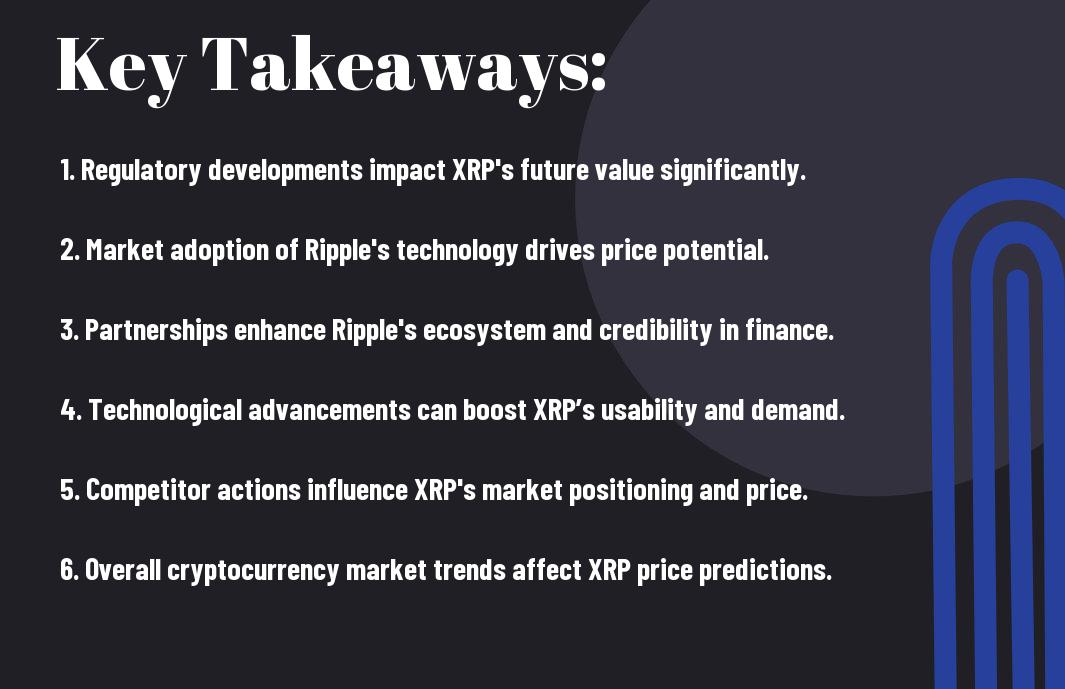Now Reading: XRP News And Ripple Updates – 7 Key Factors Influencing 2025 Price Predictions
-
01
XRP News And Ripple Updates – 7 Key Factors Influencing 2025 Price Predictions
XRP News And Ripple Updates – 7 Key Factors Influencing 2025 Price Predictions

Over the next few years, understanding the dynamics of XRP and Ripple is crucial for predicting its price trajectory. As you navigate the evolving landscape of cryptocurrency, staying informed about the seven key factors influencing price predictions for 2025 will empower you to make better investment decisions. From regulatory developments to market trends, each factor plays a significant role in shaping the future of XRP. This blog post will guide you through the impactful updates and news, helping you grasp the potential of your investments as we approach 2025.
Key Takeaways:
- Regulatory Developments: Changes in regulations surrounding cryptocurrencies will significantly impact XRP’s market value and adoption rates.
- Market Trends: Analyzing current market trends, including investor sentiment and trading volumes, is necessary for predicting XRP’s price trajectory.
- Technological Advancements: Innovations in blockchain technology and Ripple’s solutions could enhance XRP’s utility and attract more users.
- Partnerships and Collaborations: Strategic partnerships and collaborations within the financial and tech sectors could drive XRP’s growth and value in 2025.
- Global Economic Factors: Factors such as inflation rates, crypto adoption, and global economic stability will play a role in the overall market positioning of XRP.

Overview of XRP and Ripple
Before stepping into price predictions, it’s imperative to understand the relationship between XRP and Ripple. XRP is a digital asset designed for fast and low-cost international money transfers, while Ripple is the technology and company behind it, providing payment solutions for banks and financial institutions. Together, they aim to revolutionize the global financial landscape.
What is XRP?
The XRP token is a digital currency that facilitates quick and affordable cross-border transactions. It acts as a bridge currency, allowing users to transfer value across different fiat currencies without needing a central intermediary. As one of the leading cryptocurrencies, XRP plays a significant role in enhancing liquidity for various financial institutions.
The Role of Ripple in the Cryptocurrency Market
By leveraging advanced technologies, Ripple aims to streamline financial transactions and offers a suite of products for payment processing. Its innovative approach has positioned Ripple as a viable solution for banks and payment providers looking for efficiency and cost-effectiveness.
Due to its partnerships with numerous financial institutions and a focus on regulatory compliance, Ripple has established itself as a pivotal player in the cryptocurrency market. Your investment in XRP can be influenced by Ripple’s ability to navigate legal challenges and maintain strong relationships with banks. The company has successfully capitalized on the need for fast and low-cost international payments, positioning itself as a leader in transforming how money is moved globally. However, you should also be aware of the potential volatility associated with regulatory developments that could impact XRP’s adoption and value.
Current Market Trends
You should stay informed about current market trends as they directly impact XRP and Ripple’s future. Observing the fluctuating interest in cryptocurrencies, regulatory developments, and technological advancements can provide valuable insights into potential price movements. Additionally, insights from market analysts and trading patterns can help you gauge the overall market sentiment and make informed decisions regarding your investments.
Historical Price Movements
The historical price movements of XRP serve as a foundational backdrop for understanding its future potential. Analyzing past peaks, troughs, and patterns can help you anticipate how XRP may perform under varying market conditions. This analysis is vital when considering long-term investment strategies and risk management.
Influence of Market Sentiment
Between bullish and bearish market trends, sentiment can significantly sway XRP’s price trajectory. Investor psychology often drives price fluctuations, making it vital to monitor how news, social media, and community sentiment shape opinions about XRP. Positive sentiment can result in rapid price increases, while negative news can lead to sharp declines.
Further analysis reveals that market sentiment is influenced by a myriad of factors, including regulatory news, technological developments, and macroeconomic events. Social media discussions and influential endorsements can amplify positive perceptions, driving panic buying, while negative stories may trigger sell-offs, leading to significant price drops. Staying attuned to these sentiment shifts can empower you to navigate the complexities of the market more effectively, helping to align your investment strategies with your financial goals.
Regulatory Environment
To understand the future price predictions of XRP, you must consider the regulatory environment surrounding cryptocurrency. As governments and financial authorities implement new regulations, the future of Ripple and XRP’s use case can be significantly impacted. These regulations not only dictate the operational framework of the company but can also influence investor sentiment and overall market stability.
Recent Legal Developments
After the landmark court ruling in favor of Ripple, there has been a noticeable shift in the market sentiment towards XRP. This decision has granted clarity to investors and may pave the way for more legitimate use cases for Ripple’s technology. However, the legal landscape remains dynamic, necessitating vigilance as it evolves.
Future Regulatory Challenges
Recent discussions around regulatory policies indicate that the landscape for cryptocurrencies will continue to evolve dramatically. Governments are grappling with how to best regulate digital assets without stifling innovation. This ongoing adjustment could create uncertainties for investors and Ripple’s operational strategies.
Environment factors such as changing regulations can pose significant challenges for XRP’s future. You may face potential restrictions that could affect liquidity, accessibility, or the overall acceptance of XRP in various markets. Moreover, increased scrutiny over anti-money laundering (AML) and know-your-customer (KYC) practices may require Ripple to enhance compliance measures, which could add to operational costs. Staying informed about these shifts is vital for navigating your investment decisions.
Technological Developments
After assessing the evolution of XRP, it’s evident that technological advancements play a significant role in shaping its future price trajectory. Innovations in blockchain technology, scalability solutions, and enhanced security protocols are crucial for the long-term adoption and efficiency of Ripple’s network. Keeping an eye on these developments can offer valuable insights into potential price movements by 2025.
Ripple’s Network Advancements
Across the Ripple ecosystem, continuous enhancements are being made to optimize the network’s speed and efficiency. The integration of features like liquidity provisions and improved transaction mechanisms may significantly impact user experiences and transaction volumes, thereby influencing XRP’s market position.
Integration with Financial Institutions
An increasing trend of integration with financial institutions is reshaping how Ripple and XRP are perceived in the market. As traditional banks and fintech companies adopt Ripple’s solutions, their confidence in the potential of XRP heightens.
To drive this narrative further, partnerships with prominent banks and financial services not only validate Ripple’s technology but also enhance XRP’s liquidity. This leads to a positive outlook for your investment strategy as institutional adoption often results in increased demand. Moreover, any potential regulatory challenges faced in this integration can create uncertainty; thus, understanding the evolving landscape is crucial for making informed predictions about XRP’s potential growth by 2025.
Competitive Landscape
All cryptocurrencies operate in a dynamic and rapidly evolving ecosystem, and XRP is no exception. The competitive landscape is imperative to understanding how Ripple and its digital asset, XRP, can maintain and enhance their market relevance. With growing competition from established coins and emerging projects, you must stay informed of these shifts and the unique positioning Ripple holds within this environment.
Comparison with Other Cryptocurrencies
After evaluating XRP’s performance, it’s vital to compare it against its primary competitors:
Comparison of XRP with Other Cryptocurrencies
| XRP | Designed for fast and low-cost international money transfers. |
| Bitcoin | Focuses on decentralized value storage but has slower transaction times. |
| Ethereum | Primarily caters to smart contracts and decentralized applications. |
Market Positioning of Ripple
After assessing market positioning, it’s clear that Ripple aims to differentiate itself by addressing specific financial institutional needs. With a focus on speed and low transaction costs, Ripple actively collaborates with banks and financial institutions to facilitate cross-border payments efficiently.
A critical part of Ripple’s strategy is its partnerships with various financial institutions, enhancing its credibility and adoption in traditional finance. The unique technology behind XRP, such as the XRP Ledger, positions it as a viable solution for large-scale transactions compared to slower alternatives. However, the potential regulatory scrutiny regarding XRP may present both risks and opportunities that could impact your investment decisions. In addition, as competition intensifies, Ripple must continuously adapt to maintain its market relevance.
Economic Factors
Not only do economic factors shape the future of XRP and Ripple, but they also play a significant role in price predictions for 2025. Here are some key aspects you should consider:
- Global Trade Dynamics
- Market Sentiment
- Regulatory Changes
- Technological Advancements
- Adoption Rates
Knowing how these factors interact can help you better navigate the potential future of XRP.
Global Economic Trends
Trends affecting the global economy, such as shifts in consumer behavior and alterations in international trade agreements, can significantly influence the demand for cryptocurrencies like XRP. Understanding these trends allows you to anticipate changes in market dynamics that could impact your investment opportunities.
Impact of Inflation and Interest Rates
Inflation can destabilize traditional currencies, often pushing investors towards alternatives like XRP. Interest rates directly affect your investment decisions, as lower rates generally promote borrowing and spending, which can increase the adoption of cryptocurrencies. Conversely, high rates may deter investors, negatively influencing XRP’s price.
Indeed, the relationship between inflation and interest rates is more complex than it appears. When inflation rises, you may see increased interest in cryptocurrencies, positioning them as a viable hedge against currency devaluation. Meanwhile, high-interest rates can lead to a stricter monetary policy, reducing liquidity in the market, which might hurt XRP’s growth potential. If the economy stabilizes and interest rates remain low, you could observe significant capital flowing into crypto, bolstering XRP’s position. Understanding these factors will enhance your investment strategy in the long run.
To wrap up
On the whole, understanding the key factors that influence XRP news and Ripple’s updates will empower you as an investor to make informed decisions regarding potential price movements in 2025. By staying updated on regulatory developments, market trends, institutional adoption, and technological advancements, you will be better positioned to navigate the evolving landscape of digital assets. Your awareness of these dynamics can significantly impact your strategies for engaging with XRP, setting you up for greater success in the evolving cryptocurrency market.
FAQ
Q: What are the main factors influencing the price prediction of XRP for 2025?
A: Various factors play a significant role in the price prediction of XRP for 2025. These include regulatory developments, overall market trends in cryptocurrency, the adoption of Ripple’s technology by financial institutions, advancements in Ripple’s partnerships, changes in the competitive landscape, the overall global economic conditions, and the performance of Bitcoin and other major cryptocurrencies.
Q: How do regulatory changes affect XRP’s price projections?
A: Regulatory changes can significantly impact XRP’s price as they influence investor confidence and market accessibility. Positive regulations can enhance adoption and increase institutional investment, while negative regulatory news can lead to uncertainty and potential price declines. Keeping an eye on legislative developments in major markets like the U.S. and Europe is imperative for anticipating price movements.
Q: What role does Ripple’s technology play in the future demand for XRP?
A: Ripple’s technology directly affects XRP’s demand, as it is designed to facilitate fast, low-cost cross-border transactions. If more banks and financial institutions adopt RippleNet and utilize XRP for liquidity, demand for XRP is likely to increase, potentially driving up its price as more users turn to the network for transactions.
Q: How does Bitcoin’s performance influence XRP’s price?
A: Bitcoin often serves as a bellwether for the entire cryptocurrency market. Its price movements can lead to investor sentiment shifts towards altcoins like XRP. When Bitcoin experiences upward momentum, it can trigger a bullish trend across the market, potentially benefiting XRP. Conversely, declines in Bitcoin can negatively impact XRP’s price as traders may pull back from investing in other cryptocurrencies.
Q: What is the significance of partnerships in XRP’s market outlook for 2025?
A: Partnerships are vital for XRP’s market outlook as they can validate the utility and scalability of Ripple’s solutions. Collaborations with financial institutions, payment providers, and fintech companies demonstrate the practical applications of XRP, fostering trust and encouraging adoption. Strong partnerships can enhance liquidity in XRP markets and provide a foundation for a more substantial price elevation by 2025.























